Sociology Report: Analyzing Gender Discrimination and Social Outcomes
VerifiedAdded on 2022/09/05
|12
|3576
|20
Report
AI Summary
This report presents a research design focused on the impact of gender inequality on social development outcomes in the UK. It begins with an introduction and research question exploring the sociological significance of gender inequality and its relevance to human rights. The report includes a literature review examining existing research on the topic and a discussion of the research methodology, including the role of theory, research approach, data collection methods (secondary and primary), sampling strategy, and data analysis. The findings highlight the negative influence of gender inequality on social progress, emphasizing differences in income, education, and employment. The report also addresses potential practical problems and ethical issues that may arise during the research process. The research employs an inductive approach and uses both secondary and primary data collection methods, including surveys, to gather information and analyze the impact of gender inequality.
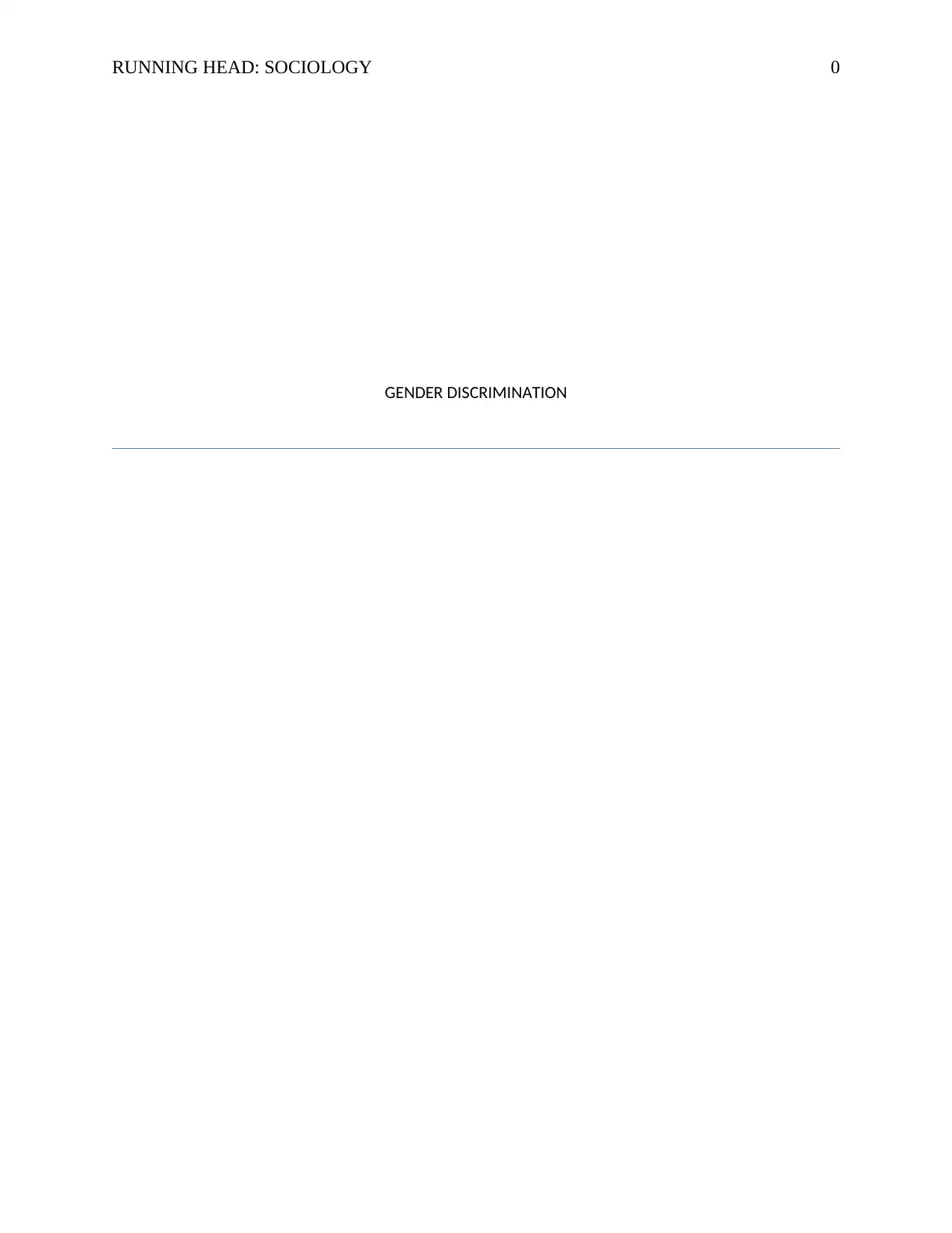
RUNNING HEAD: SOCIOLOGY 0
GENDER DISCRIMINATION
GENDER DISCRIMINATION
Paraphrase This Document
Need a fresh take? Get an instant paraphrase of this document with our AI Paraphraser
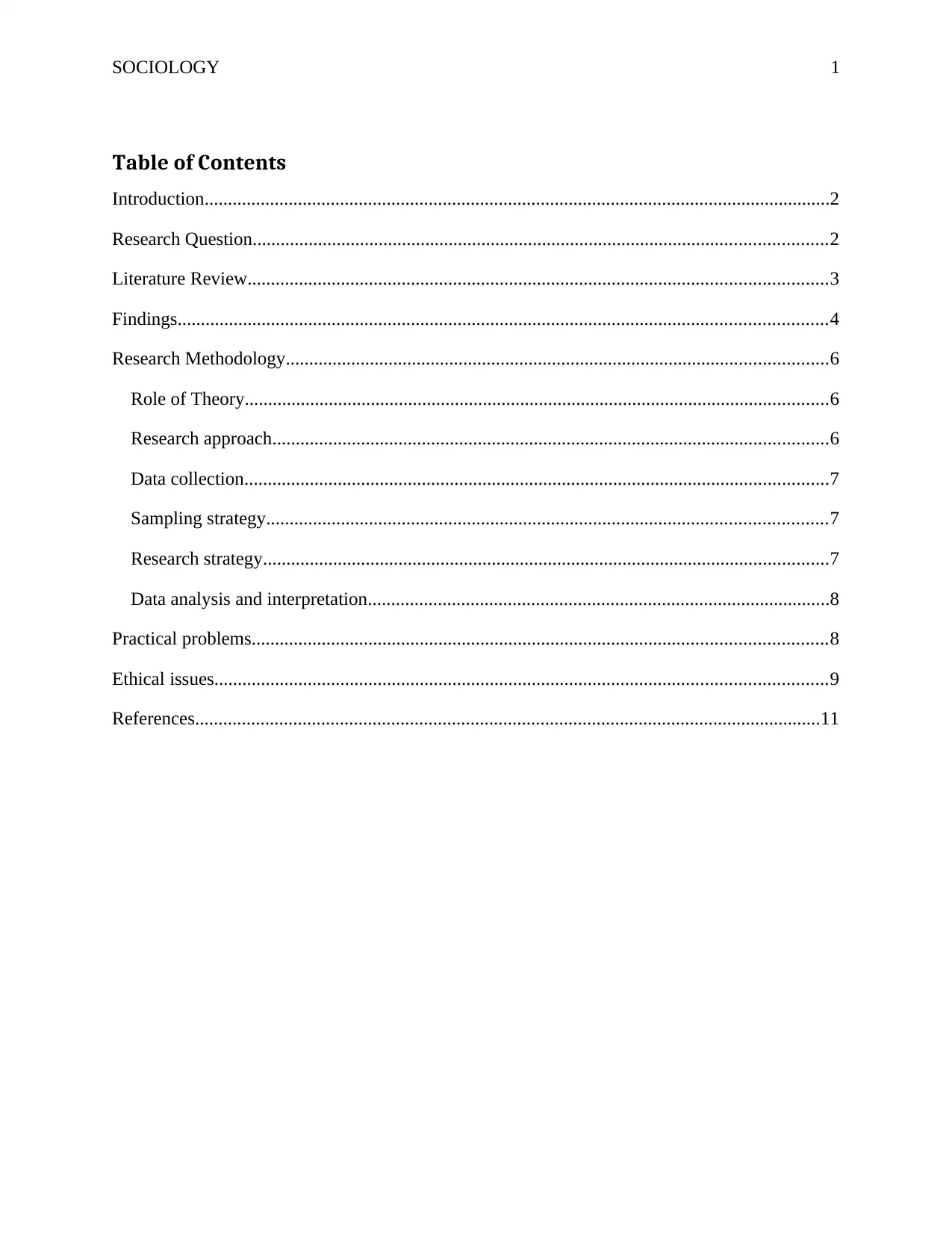
SOCIOLOGY 1
Table of Contents
Introduction......................................................................................................................................2
Research Question...........................................................................................................................2
Literature Review............................................................................................................................3
Findings...........................................................................................................................................4
Research Methodology....................................................................................................................6
Role of Theory.............................................................................................................................6
Research approach.......................................................................................................................6
Data collection.............................................................................................................................7
Sampling strategy........................................................................................................................7
Research strategy.........................................................................................................................7
Data analysis and interpretation...................................................................................................8
Practical problems...........................................................................................................................8
Ethical issues...................................................................................................................................9
References......................................................................................................................................11
Table of Contents
Introduction......................................................................................................................................2
Research Question...........................................................................................................................2
Literature Review............................................................................................................................3
Findings...........................................................................................................................................4
Research Methodology....................................................................................................................6
Role of Theory.............................................................................................................................6
Research approach.......................................................................................................................6
Data collection.............................................................................................................................7
Sampling strategy........................................................................................................................7
Research strategy.........................................................................................................................7
Data analysis and interpretation...................................................................................................8
Practical problems...........................................................................................................................8
Ethical issues...................................................................................................................................9
References......................................................................................................................................11
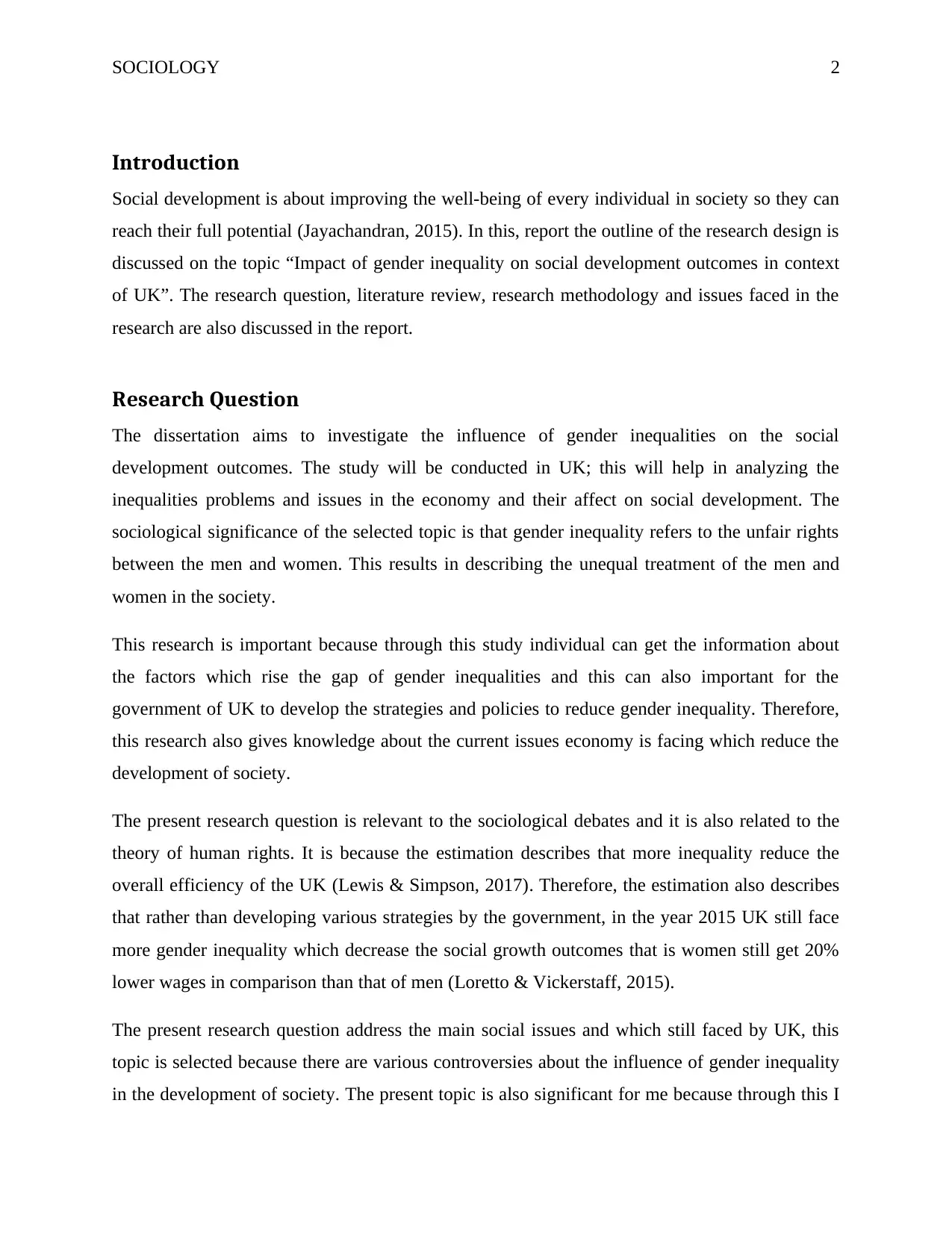
SOCIOLOGY 2
Introduction
Social development is about improving the well-being of every individual in society so they can
reach their full potential (Jayachandran, 2015). In this, report the outline of the research design is
discussed on the topic “Impact of gender inequality on social development outcomes in context
of UK”. The research question, literature review, research methodology and issues faced in the
research are also discussed in the report.
Research Question
The dissertation aims to investigate the influence of gender inequalities on the social
development outcomes. The study will be conducted in UK; this will help in analyzing the
inequalities problems and issues in the economy and their affect on social development. The
sociological significance of the selected topic is that gender inequality refers to the unfair rights
between the men and women. This results in describing the unequal treatment of the men and
women in the society.
This research is important because through this study individual can get the information about
the factors which rise the gap of gender inequalities and this can also important for the
government of UK to develop the strategies and policies to reduce gender inequality. Therefore,
this research also gives knowledge about the current issues economy is facing which reduce the
development of society.
The present research question is relevant to the sociological debates and it is also related to the
theory of human rights. It is because the estimation describes that more inequality reduce the
overall efficiency of the UK (Lewis & Simpson, 2017). Therefore, the estimation also describes
that rather than developing various strategies by the government, in the year 2015 UK still face
more gender inequality which decrease the social growth outcomes that is women still get 20%
lower wages in comparison than that of men (Loretto & Vickerstaff, 2015).
The present research question address the main social issues and which still faced by UK, this
topic is selected because there are various controversies about the influence of gender inequality
in the development of society. The present topic is also significant for me because through this I
Introduction
Social development is about improving the well-being of every individual in society so they can
reach their full potential (Jayachandran, 2015). In this, report the outline of the research design is
discussed on the topic “Impact of gender inequality on social development outcomes in context
of UK”. The research question, literature review, research methodology and issues faced in the
research are also discussed in the report.
Research Question
The dissertation aims to investigate the influence of gender inequalities on the social
development outcomes. The study will be conducted in UK; this will help in analyzing the
inequalities problems and issues in the economy and their affect on social development. The
sociological significance of the selected topic is that gender inequality refers to the unfair rights
between the men and women. This results in describing the unequal treatment of the men and
women in the society.
This research is important because through this study individual can get the information about
the factors which rise the gap of gender inequalities and this can also important for the
government of UK to develop the strategies and policies to reduce gender inequality. Therefore,
this research also gives knowledge about the current issues economy is facing which reduce the
development of society.
The present research question is relevant to the sociological debates and it is also related to the
theory of human rights. It is because the estimation describes that more inequality reduce the
overall efficiency of the UK (Lewis & Simpson, 2017). Therefore, the estimation also describes
that rather than developing various strategies by the government, in the year 2015 UK still face
more gender inequality which decrease the social growth outcomes that is women still get 20%
lower wages in comparison than that of men (Loretto & Vickerstaff, 2015).
The present research question address the main social issues and which still faced by UK, this
topic is selected because there are various controversies about the influence of gender inequality
in the development of society. The present topic is also significant for me because through this I
⊘ This is a preview!⊘
Do you want full access?
Subscribe today to unlock all pages.

Trusted by 1+ million students worldwide
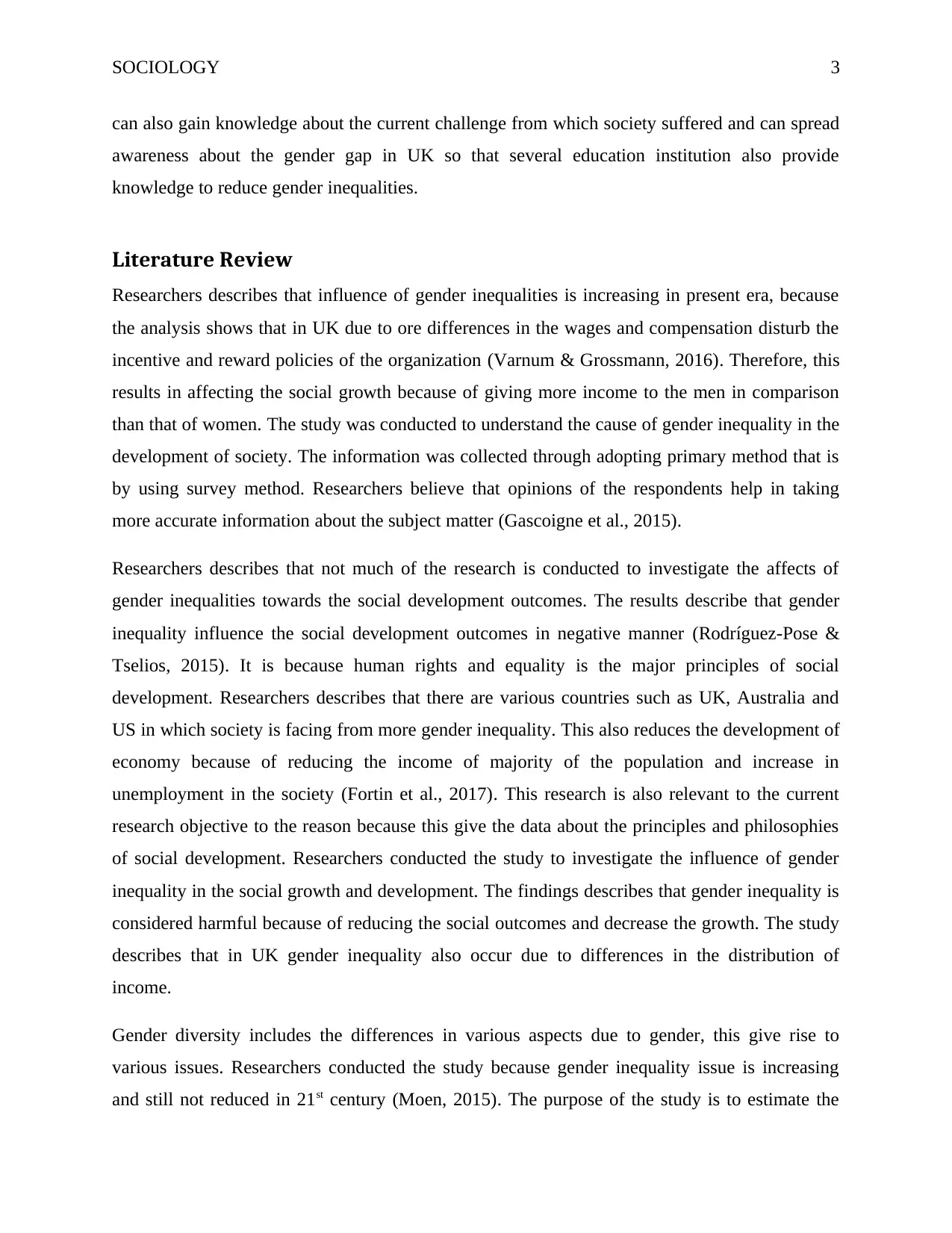
SOCIOLOGY 3
can also gain knowledge about the current challenge from which society suffered and can spread
awareness about the gender gap in UK so that several education institution also provide
knowledge to reduce gender inequalities.
Literature Review
Researchers describes that influence of gender inequalities is increasing in present era, because
the analysis shows that in UK due to ore differences in the wages and compensation disturb the
incentive and reward policies of the organization (Varnum & Grossmann, 2016). Therefore, this
results in affecting the social growth because of giving more income to the men in comparison
than that of women. The study was conducted to understand the cause of gender inequality in the
development of society. The information was collected through adopting primary method that is
by using survey method. Researchers believe that opinions of the respondents help in taking
more accurate information about the subject matter (Gascoigne et al., 2015).
Researchers describes that not much of the research is conducted to investigate the affects of
gender inequalities towards the social development outcomes. The results describe that gender
inequality influence the social development outcomes in negative manner (Rodríguez-Pose &
Tselios, 2015). It is because human rights and equality is the major principles of social
development. Researchers describes that there are various countries such as UK, Australia and
US in which society is facing from more gender inequality. This also reduces the development of
economy because of reducing the income of majority of the population and increase in
unemployment in the society (Fortin et al., 2017). This research is also relevant to the current
research objective to the reason because this give the data about the principles and philosophies
of social development. Researchers conducted the study to investigate the influence of gender
inequality in the social growth and development. The findings describes that gender inequality is
considered harmful because of reducing the social outcomes and decrease the growth. The study
describes that in UK gender inequality also occur due to differences in the distribution of
income.
Gender diversity includes the differences in various aspects due to gender, this give rise to
various issues. Researchers conducted the study because gender inequality issue is increasing
and still not reduced in 21st century (Moen, 2015). The purpose of the study is to estimate the
can also gain knowledge about the current challenge from which society suffered and can spread
awareness about the gender gap in UK so that several education institution also provide
knowledge to reduce gender inequalities.
Literature Review
Researchers describes that influence of gender inequalities is increasing in present era, because
the analysis shows that in UK due to ore differences in the wages and compensation disturb the
incentive and reward policies of the organization (Varnum & Grossmann, 2016). Therefore, this
results in affecting the social growth because of giving more income to the men in comparison
than that of women. The study was conducted to understand the cause of gender inequality in the
development of society. The information was collected through adopting primary method that is
by using survey method. Researchers believe that opinions of the respondents help in taking
more accurate information about the subject matter (Gascoigne et al., 2015).
Researchers describes that not much of the research is conducted to investigate the affects of
gender inequalities towards the social development outcomes. The results describe that gender
inequality influence the social development outcomes in negative manner (Rodríguez-Pose &
Tselios, 2015). It is because human rights and equality is the major principles of social
development. Researchers describes that there are various countries such as UK, Australia and
US in which society is facing from more gender inequality. This also reduces the development of
economy because of reducing the income of majority of the population and increase in
unemployment in the society (Fortin et al., 2017). This research is also relevant to the current
research objective to the reason because this give the data about the principles and philosophies
of social development. Researchers conducted the study to investigate the influence of gender
inequality in the social growth and development. The findings describes that gender inequality is
considered harmful because of reducing the social outcomes and decrease the growth. The study
describes that in UK gender inequality also occur due to differences in the distribution of
income.
Gender diversity includes the differences in various aspects due to gender, this give rise to
various issues. Researchers conducted the study because gender inequality issue is increasing
and still not reduced in 21st century (Moen, 2015). The purpose of the study is to estimate the
Paraphrase This Document
Need a fresh take? Get an instant paraphrase of this document with our AI Paraphraser
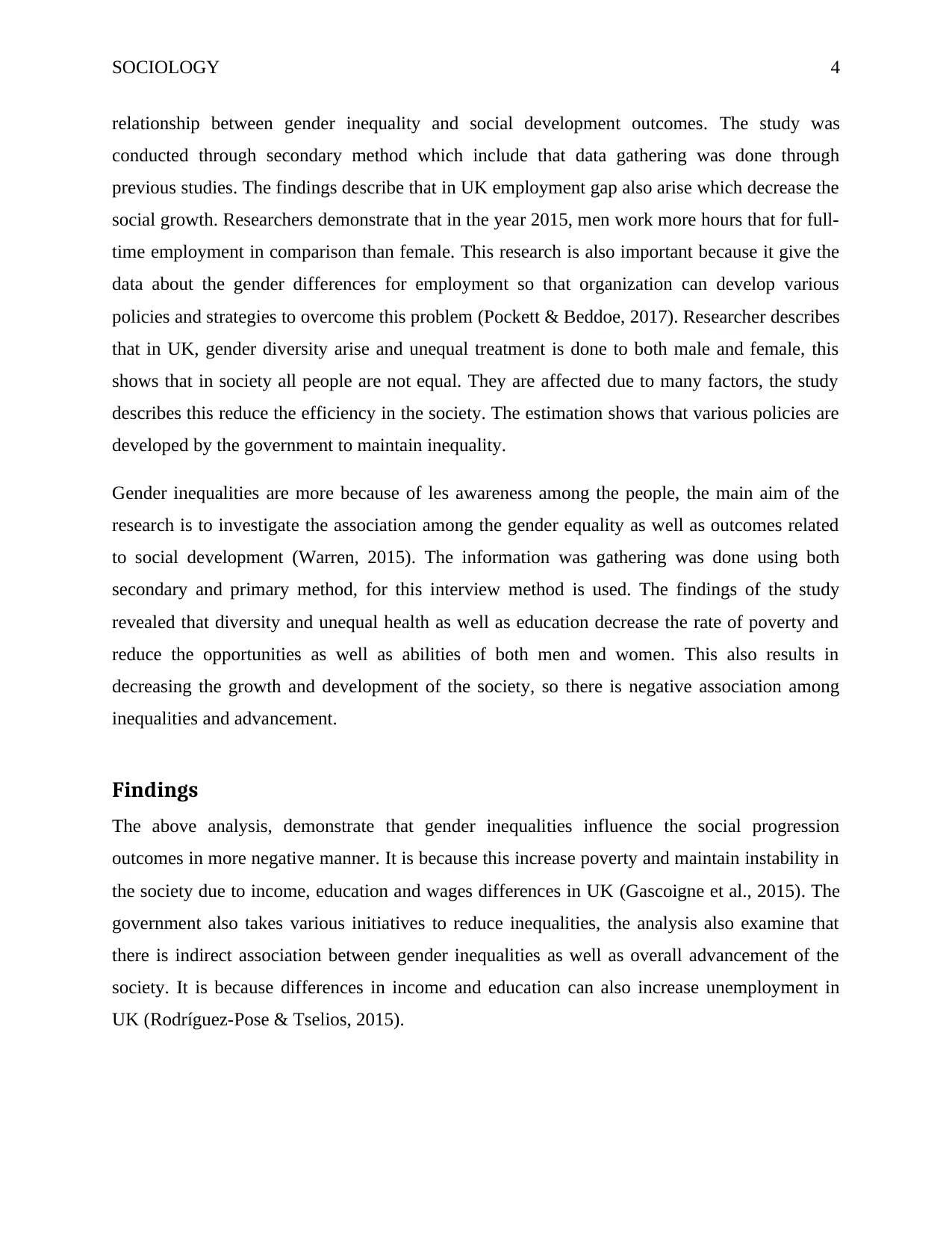
SOCIOLOGY 4
relationship between gender inequality and social development outcomes. The study was
conducted through secondary method which include that data gathering was done through
previous studies. The findings describe that in UK employment gap also arise which decrease the
social growth. Researchers demonstrate that in the year 2015, men work more hours that for full-
time employment in comparison than female. This research is also important because it give the
data about the gender differences for employment so that organization can develop various
policies and strategies to overcome this problem (Pockett & Beddoe, 2017). Researcher describes
that in UK, gender diversity arise and unequal treatment is done to both male and female, this
shows that in society all people are not equal. They are affected due to many factors, the study
describes this reduce the efficiency in the society. The estimation shows that various policies are
developed by the government to maintain inequality.
Gender inequalities are more because of les awareness among the people, the main aim of the
research is to investigate the association among the gender equality as well as outcomes related
to social development (Warren, 2015). The information was gathering was done using both
secondary and primary method, for this interview method is used. The findings of the study
revealed that diversity and unequal health as well as education decrease the rate of poverty and
reduce the opportunities as well as abilities of both men and women. This also results in
decreasing the growth and development of the society, so there is negative association among
inequalities and advancement.
Findings
The above analysis, demonstrate that gender inequalities influence the social progression
outcomes in more negative manner. It is because this increase poverty and maintain instability in
the society due to income, education and wages differences in UK (Gascoigne et al., 2015). The
government also takes various initiatives to reduce inequalities, the analysis also examine that
there is indirect association between gender inequalities as well as overall advancement of the
society. It is because differences in income and education can also increase unemployment in
UK (Rodríguez-Pose & Tselios, 2015).
relationship between gender inequality and social development outcomes. The study was
conducted through secondary method which include that data gathering was done through
previous studies. The findings describe that in UK employment gap also arise which decrease the
social growth. Researchers demonstrate that in the year 2015, men work more hours that for full-
time employment in comparison than female. This research is also important because it give the
data about the gender differences for employment so that organization can develop various
policies and strategies to overcome this problem (Pockett & Beddoe, 2017). Researcher describes
that in UK, gender diversity arise and unequal treatment is done to both male and female, this
shows that in society all people are not equal. They are affected due to many factors, the study
describes this reduce the efficiency in the society. The estimation shows that various policies are
developed by the government to maintain inequality.
Gender inequalities are more because of les awareness among the people, the main aim of the
research is to investigate the association among the gender equality as well as outcomes related
to social development (Warren, 2015). The information was gathering was done using both
secondary and primary method, for this interview method is used. The findings of the study
revealed that diversity and unequal health as well as education decrease the rate of poverty and
reduce the opportunities as well as abilities of both men and women. This also results in
decreasing the growth and development of the society, so there is negative association among
inequalities and advancement.
Findings
The above analysis, demonstrate that gender inequalities influence the social progression
outcomes in more negative manner. It is because this increase poverty and maintain instability in
the society due to income, education and wages differences in UK (Gascoigne et al., 2015). The
government also takes various initiatives to reduce inequalities, the analysis also examine that
there is indirect association between gender inequalities as well as overall advancement of the
society. It is because differences in income and education can also increase unemployment in
UK (Rodríguez-Pose & Tselios, 2015).
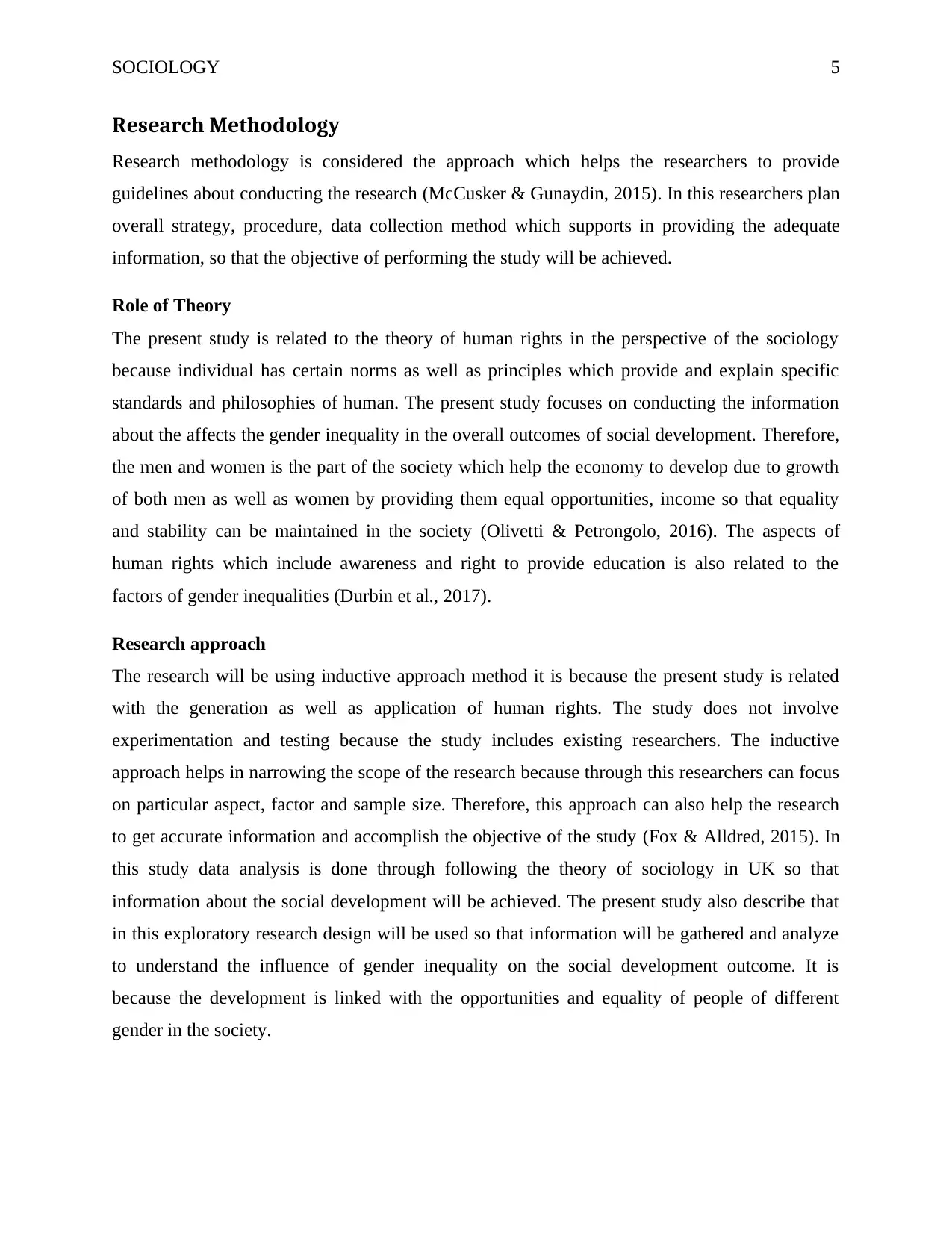
SOCIOLOGY 5
Research Methodology
Research methodology is considered the approach which helps the researchers to provide
guidelines about conducting the research (McCusker & Gunaydin, 2015). In this researchers plan
overall strategy, procedure, data collection method which supports in providing the adequate
information, so that the objective of performing the study will be achieved.
Role of Theory
The present study is related to the theory of human rights in the perspective of the sociology
because individual has certain norms as well as principles which provide and explain specific
standards and philosophies of human. The present study focuses on conducting the information
about the affects the gender inequality in the overall outcomes of social development. Therefore,
the men and women is the part of the society which help the economy to develop due to growth
of both men as well as women by providing them equal opportunities, income so that equality
and stability can be maintained in the society (Olivetti & Petrongolo, 2016). The aspects of
human rights which include awareness and right to provide education is also related to the
factors of gender inequalities (Durbin et al., 2017).
Research approach
The research will be using inductive approach method it is because the present study is related
with the generation as well as application of human rights. The study does not involve
experimentation and testing because the study includes existing researchers. The inductive
approach helps in narrowing the scope of the research because through this researchers can focus
on particular aspect, factor and sample size. Therefore, this approach can also help the research
to get accurate information and accomplish the objective of the study (Fox & Alldred, 2015). In
this study data analysis is done through following the theory of sociology in UK so that
information about the social development will be achieved. The present study also describe that
in this exploratory research design will be used so that information will be gathered and analyze
to understand the influence of gender inequality on the social development outcome. It is
because the development is linked with the opportunities and equality of people of different
gender in the society.
Research Methodology
Research methodology is considered the approach which helps the researchers to provide
guidelines about conducting the research (McCusker & Gunaydin, 2015). In this researchers plan
overall strategy, procedure, data collection method which supports in providing the adequate
information, so that the objective of performing the study will be achieved.
Role of Theory
The present study is related to the theory of human rights in the perspective of the sociology
because individual has certain norms as well as principles which provide and explain specific
standards and philosophies of human. The present study focuses on conducting the information
about the affects the gender inequality in the overall outcomes of social development. Therefore,
the men and women is the part of the society which help the economy to develop due to growth
of both men as well as women by providing them equal opportunities, income so that equality
and stability can be maintained in the society (Olivetti & Petrongolo, 2016). The aspects of
human rights which include awareness and right to provide education is also related to the
factors of gender inequalities (Durbin et al., 2017).
Research approach
The research will be using inductive approach method it is because the present study is related
with the generation as well as application of human rights. The study does not involve
experimentation and testing because the study includes existing researchers. The inductive
approach helps in narrowing the scope of the research because through this researchers can focus
on particular aspect, factor and sample size. Therefore, this approach can also help the research
to get accurate information and accomplish the objective of the study (Fox & Alldred, 2015). In
this study data analysis is done through following the theory of sociology in UK so that
information about the social development will be achieved. The present study also describe that
in this exploratory research design will be used so that information will be gathered and analyze
to understand the influence of gender inequality on the social development outcome. It is
because the development is linked with the opportunities and equality of people of different
gender in the society.
⊘ This is a preview!⊘
Do you want full access?
Subscribe today to unlock all pages.

Trusted by 1+ million students worldwide
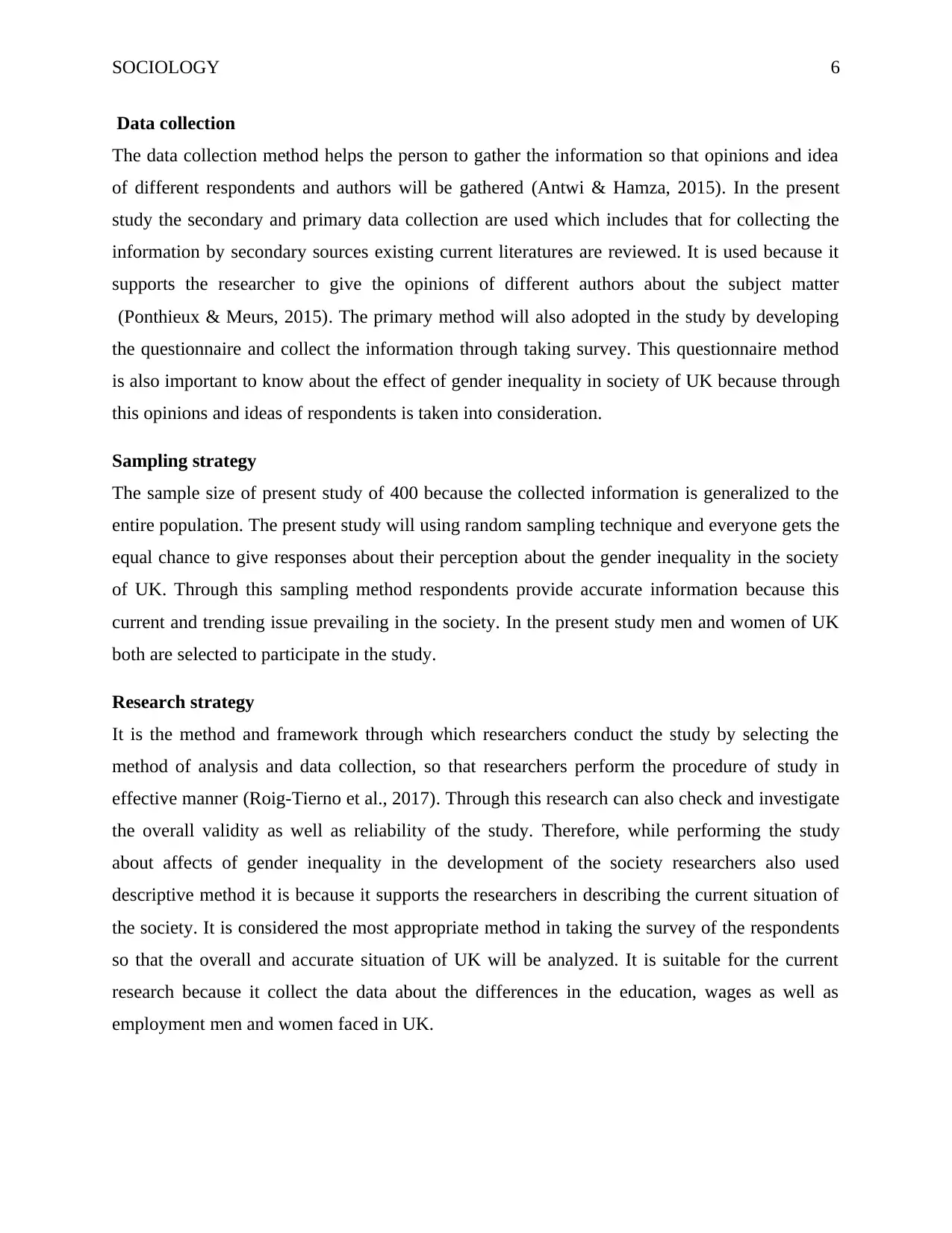
SOCIOLOGY 6
Data collection
The data collection method helps the person to gather the information so that opinions and idea
of different respondents and authors will be gathered (Antwi & Hamza, 2015). In the present
study the secondary and primary data collection are used which includes that for collecting the
information by secondary sources existing current literatures are reviewed. It is used because it
supports the researcher to give the opinions of different authors about the subject matter
(Ponthieux & Meurs, 2015). The primary method will also adopted in the study by developing
the questionnaire and collect the information through taking survey. This questionnaire method
is also important to know about the effect of gender inequality in society of UK because through
this opinions and ideas of respondents is taken into consideration.
Sampling strategy
The sample size of present study of 400 because the collected information is generalized to the
entire population. The present study will using random sampling technique and everyone gets the
equal chance to give responses about their perception about the gender inequality in the society
of UK. Through this sampling method respondents provide accurate information because this
current and trending issue prevailing in the society. In the present study men and women of UK
both are selected to participate in the study.
Research strategy
It is the method and framework through which researchers conduct the study by selecting the
method of analysis and data collection, so that researchers perform the procedure of study in
effective manner (Roig-Tierno et al., 2017). Through this research can also check and investigate
the overall validity as well as reliability of the study. Therefore, while performing the study
about affects of gender inequality in the development of the society researchers also used
descriptive method it is because it supports the researchers in describing the current situation of
the society. It is considered the most appropriate method in taking the survey of the respondents
so that the overall and accurate situation of UK will be analyzed. It is suitable for the current
research because it collect the data about the differences in the education, wages as well as
employment men and women faced in UK.
Data collection
The data collection method helps the person to gather the information so that opinions and idea
of different respondents and authors will be gathered (Antwi & Hamza, 2015). In the present
study the secondary and primary data collection are used which includes that for collecting the
information by secondary sources existing current literatures are reviewed. It is used because it
supports the researcher to give the opinions of different authors about the subject matter
(Ponthieux & Meurs, 2015). The primary method will also adopted in the study by developing
the questionnaire and collect the information through taking survey. This questionnaire method
is also important to know about the effect of gender inequality in society of UK because through
this opinions and ideas of respondents is taken into consideration.
Sampling strategy
The sample size of present study of 400 because the collected information is generalized to the
entire population. The present study will using random sampling technique and everyone gets the
equal chance to give responses about their perception about the gender inequality in the society
of UK. Through this sampling method respondents provide accurate information because this
current and trending issue prevailing in the society. In the present study men and women of UK
both are selected to participate in the study.
Research strategy
It is the method and framework through which researchers conduct the study by selecting the
method of analysis and data collection, so that researchers perform the procedure of study in
effective manner (Roig-Tierno et al., 2017). Through this research can also check and investigate
the overall validity as well as reliability of the study. Therefore, while performing the study
about affects of gender inequality in the development of the society researchers also used
descriptive method it is because it supports the researchers in describing the current situation of
the society. It is considered the most appropriate method in taking the survey of the respondents
so that the overall and accurate situation of UK will be analyzed. It is suitable for the current
research because it collect the data about the differences in the education, wages as well as
employment men and women faced in UK.
Paraphrase This Document
Need a fresh take? Get an instant paraphrase of this document with our AI Paraphraser
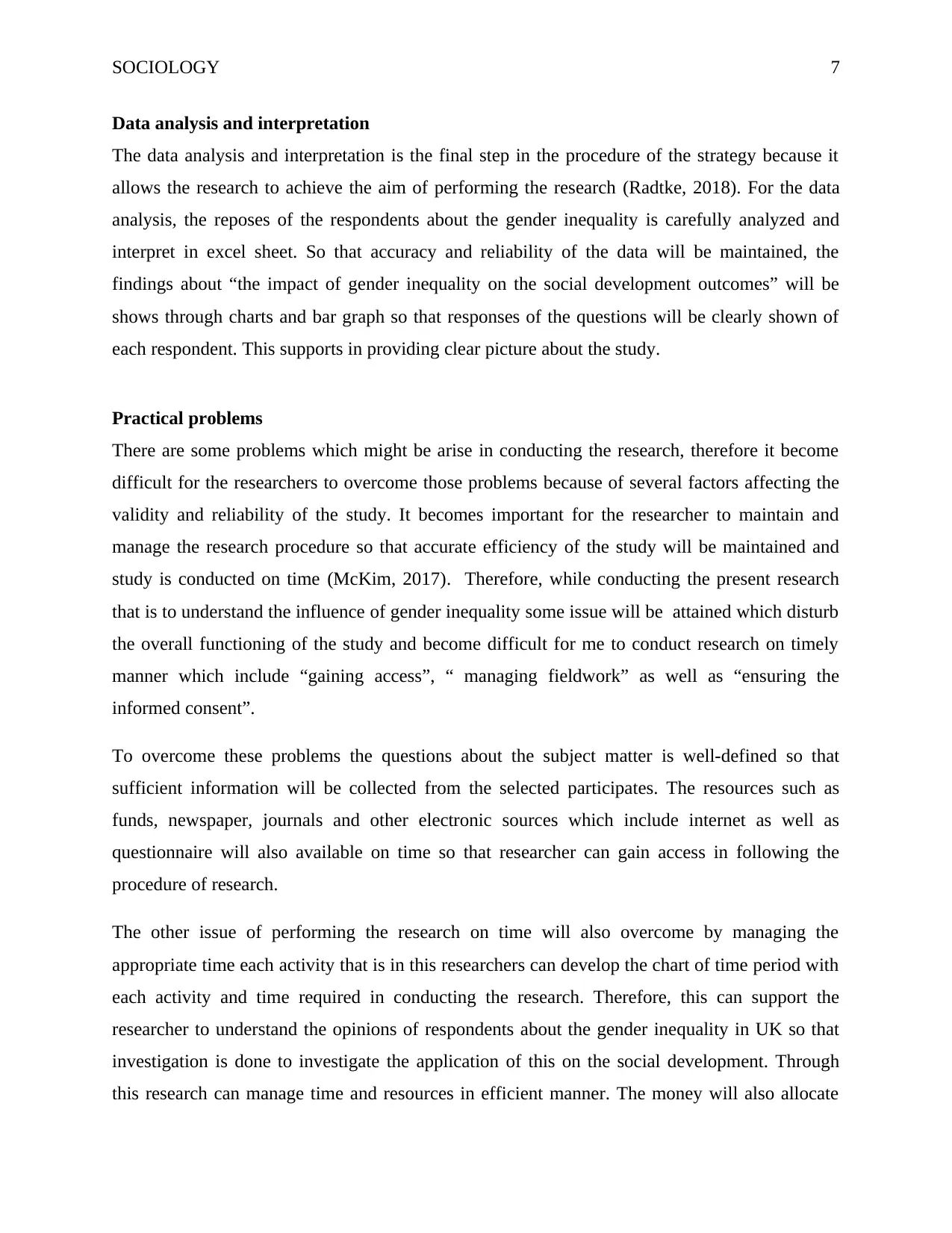
SOCIOLOGY 7
Data analysis and interpretation
The data analysis and interpretation is the final step in the procedure of the strategy because it
allows the research to achieve the aim of performing the research (Radtke, 2018). For the data
analysis, the reposes of the respondents about the gender inequality is carefully analyzed and
interpret in excel sheet. So that accuracy and reliability of the data will be maintained, the
findings about “the impact of gender inequality on the social development outcomes” will be
shows through charts and bar graph so that responses of the questions will be clearly shown of
each respondent. This supports in providing clear picture about the study.
Practical problems
There are some problems which might be arise in conducting the research, therefore it become
difficult for the researchers to overcome those problems because of several factors affecting the
validity and reliability of the study. It becomes important for the researcher to maintain and
manage the research procedure so that accurate efficiency of the study will be maintained and
study is conducted on time (McKim, 2017). Therefore, while conducting the present research
that is to understand the influence of gender inequality some issue will be attained which disturb
the overall functioning of the study and become difficult for me to conduct research on timely
manner which include “gaining access”, “ managing fieldwork” as well as “ensuring the
informed consent”.
To overcome these problems the questions about the subject matter is well-defined so that
sufficient information will be collected from the selected participates. The resources such as
funds, newspaper, journals and other electronic sources which include internet as well as
questionnaire will also available on time so that researcher can gain access in following the
procedure of research.
The other issue of performing the research on time will also overcome by managing the
appropriate time each activity that is in this researchers can develop the chart of time period with
each activity and time required in conducting the research. Therefore, this can support the
researcher to understand the opinions of respondents about the gender inequality in UK so that
investigation is done to investigate the application of this on the social development. Through
this research can manage time and resources in efficient manner. The money will also allocate
Data analysis and interpretation
The data analysis and interpretation is the final step in the procedure of the strategy because it
allows the research to achieve the aim of performing the research (Radtke, 2018). For the data
analysis, the reposes of the respondents about the gender inequality is carefully analyzed and
interpret in excel sheet. So that accuracy and reliability of the data will be maintained, the
findings about “the impact of gender inequality on the social development outcomes” will be
shows through charts and bar graph so that responses of the questions will be clearly shown of
each respondent. This supports in providing clear picture about the study.
Practical problems
There are some problems which might be arise in conducting the research, therefore it become
difficult for the researchers to overcome those problems because of several factors affecting the
validity and reliability of the study. It becomes important for the researcher to maintain and
manage the research procedure so that accurate efficiency of the study will be maintained and
study is conducted on time (McKim, 2017). Therefore, while conducting the present research
that is to understand the influence of gender inequality some issue will be attained which disturb
the overall functioning of the study and become difficult for me to conduct research on timely
manner which include “gaining access”, “ managing fieldwork” as well as “ensuring the
informed consent”.
To overcome these problems the questions about the subject matter is well-defined so that
sufficient information will be collected from the selected participates. The resources such as
funds, newspaper, journals and other electronic sources which include internet as well as
questionnaire will also available on time so that researcher can gain access in following the
procedure of research.
The other issue of performing the research on time will also overcome by managing the
appropriate time each activity that is in this researchers can develop the chart of time period with
each activity and time required in conducting the research. Therefore, this can support the
researcher to understand the opinions of respondents about the gender inequality in UK so that
investigation is done to investigate the application of this on the social development. Through
this research can manage time and resources in efficient manner. The money will also allocate
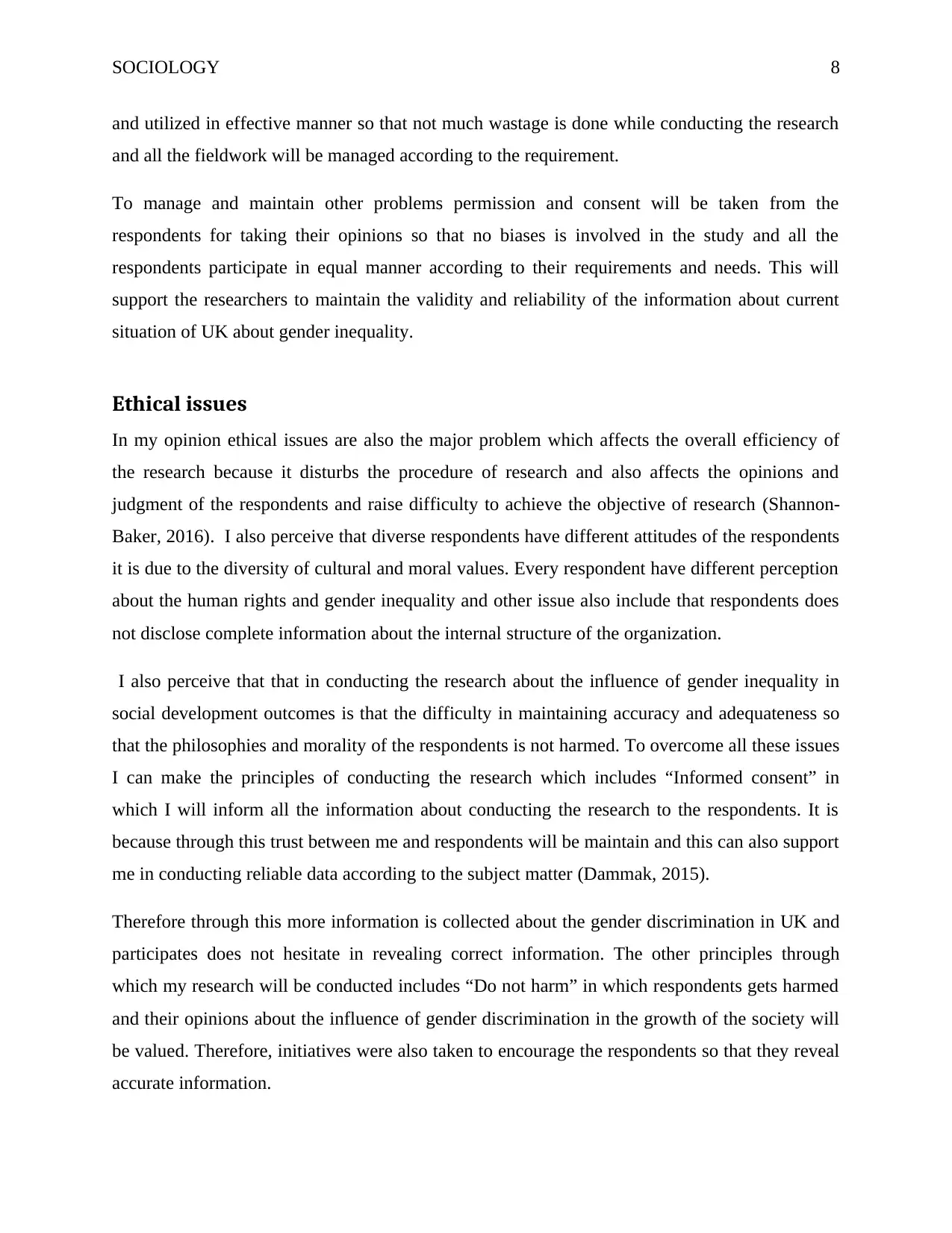
SOCIOLOGY 8
and utilized in effective manner so that not much wastage is done while conducting the research
and all the fieldwork will be managed according to the requirement.
To manage and maintain other problems permission and consent will be taken from the
respondents for taking their opinions so that no biases is involved in the study and all the
respondents participate in equal manner according to their requirements and needs. This will
support the researchers to maintain the validity and reliability of the information about current
situation of UK about gender inequality.
Ethical issues
In my opinion ethical issues are also the major problem which affects the overall efficiency of
the research because it disturbs the procedure of research and also affects the opinions and
judgment of the respondents and raise difficulty to achieve the objective of research (Shannon-
Baker, 2016). I also perceive that diverse respondents have different attitudes of the respondents
it is due to the diversity of cultural and moral values. Every respondent have different perception
about the human rights and gender inequality and other issue also include that respondents does
not disclose complete information about the internal structure of the organization.
I also perceive that that in conducting the research about the influence of gender inequality in
social development outcomes is that the difficulty in maintaining accuracy and adequateness so
that the philosophies and morality of the respondents is not harmed. To overcome all these issues
I can make the principles of conducting the research which includes “Informed consent” in
which I will inform all the information about conducting the research to the respondents. It is
because through this trust between me and respondents will be maintain and this can also support
me in conducting reliable data according to the subject matter (Dammak, 2015).
Therefore through this more information is collected about the gender discrimination in UK and
participates does not hesitate in revealing correct information. The other principles through
which my research will be conducted includes “Do not harm” in which respondents gets harmed
and their opinions about the influence of gender discrimination in the growth of the society will
be valued. Therefore, initiatives were also taken to encourage the respondents so that they reveal
accurate information.
and utilized in effective manner so that not much wastage is done while conducting the research
and all the fieldwork will be managed according to the requirement.
To manage and maintain other problems permission and consent will be taken from the
respondents for taking their opinions so that no biases is involved in the study and all the
respondents participate in equal manner according to their requirements and needs. This will
support the researchers to maintain the validity and reliability of the information about current
situation of UK about gender inequality.
Ethical issues
In my opinion ethical issues are also the major problem which affects the overall efficiency of
the research because it disturbs the procedure of research and also affects the opinions and
judgment of the respondents and raise difficulty to achieve the objective of research (Shannon-
Baker, 2016). I also perceive that diverse respondents have different attitudes of the respondents
it is due to the diversity of cultural and moral values. Every respondent have different perception
about the human rights and gender inequality and other issue also include that respondents does
not disclose complete information about the internal structure of the organization.
I also perceive that that in conducting the research about the influence of gender inequality in
social development outcomes is that the difficulty in maintaining accuracy and adequateness so
that the philosophies and morality of the respondents is not harmed. To overcome all these issues
I can make the principles of conducting the research which includes “Informed consent” in
which I will inform all the information about conducting the research to the respondents. It is
because through this trust between me and respondents will be maintain and this can also support
me in conducting reliable data according to the subject matter (Dammak, 2015).
Therefore through this more information is collected about the gender discrimination in UK and
participates does not hesitate in revealing correct information. The other principles through
which my research will be conducted includes “Do not harm” in which respondents gets harmed
and their opinions about the influence of gender discrimination in the growth of the society will
be valued. Therefore, initiatives were also taken to encourage the respondents so that they reveal
accurate information.
⊘ This is a preview!⊘
Do you want full access?
Subscribe today to unlock all pages.

Trusted by 1+ million students worldwide
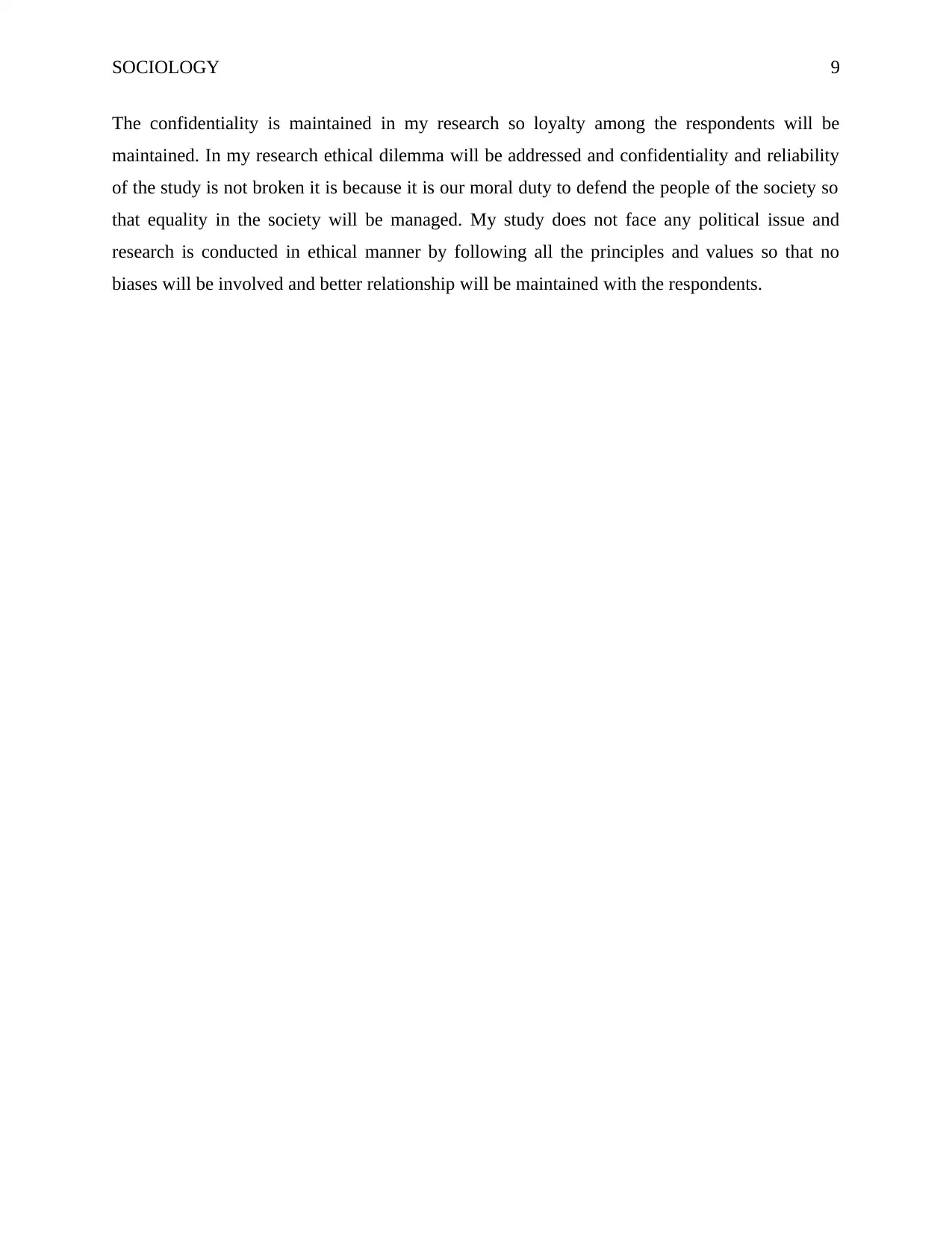
SOCIOLOGY 9
The confidentiality is maintained in my research so loyalty among the respondents will be
maintained. In my research ethical dilemma will be addressed and confidentiality and reliability
of the study is not broken it is because it is our moral duty to defend the people of the society so
that equality in the society will be managed. My study does not face any political issue and
research is conducted in ethical manner by following all the principles and values so that no
biases will be involved and better relationship will be maintained with the respondents.
The confidentiality is maintained in my research so loyalty among the respondents will be
maintained. In my research ethical dilemma will be addressed and confidentiality and reliability
of the study is not broken it is because it is our moral duty to defend the people of the society so
that equality in the society will be managed. My study does not face any political issue and
research is conducted in ethical manner by following all the principles and values so that no
biases will be involved and better relationship will be maintained with the respondents.
Paraphrase This Document
Need a fresh take? Get an instant paraphrase of this document with our AI Paraphraser
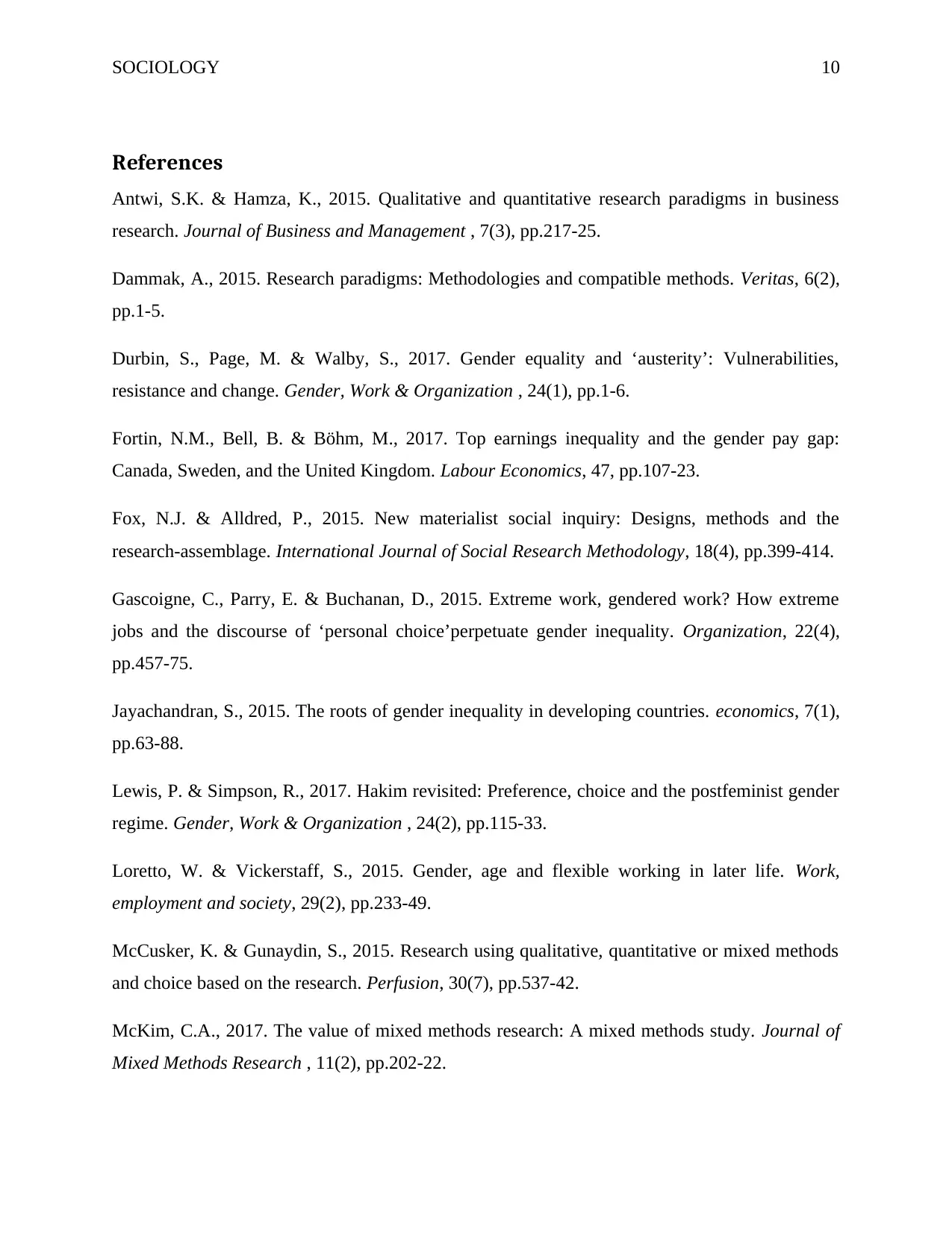
SOCIOLOGY 10
References
Antwi, S.K. & Hamza, K., 2015. Qualitative and quantitative research paradigms in business
research. Journal of Business and Management , 7(3), pp.217-25.
Dammak, A., 2015. Research paradigms: Methodologies and compatible methods. Veritas, 6(2),
pp.1-5.
Durbin, S., Page, M. & Walby, S., 2017. Gender equality and ‘austerity’: Vulnerabilities,
resistance and change. Gender, Work & Organization , 24(1), pp.1-6.
Fortin, N.M., Bell, B. & Böhm, M., 2017. Top earnings inequality and the gender pay gap:
Canada, Sweden, and the United Kingdom. Labour Economics, 47, pp.107-23.
Fox, N.J. & Alldred, P., 2015. New materialist social inquiry: Designs, methods and the
research-assemblage. International Journal of Social Research Methodology, 18(4), pp.399-414.
Gascoigne, C., Parry, E. & Buchanan, D., 2015. Extreme work, gendered work? How extreme
jobs and the discourse of ‘personal choice’perpetuate gender inequality. Organization, 22(4),
pp.457-75.
Jayachandran, S., 2015. The roots of gender inequality in developing countries. economics, 7(1),
pp.63-88.
Lewis, P. & Simpson, R., 2017. Hakim revisited: Preference, choice and the postfeminist gender
regime. Gender, Work & Organization , 24(2), pp.115-33.
Loretto, W. & Vickerstaff, S., 2015. Gender, age and flexible working in later life. Work,
employment and society, 29(2), pp.233-49.
McCusker, K. & Gunaydin, S., 2015. Research using qualitative, quantitative or mixed methods
and choice based on the research. Perfusion, 30(7), pp.537-42.
McKim, C.A., 2017. The value of mixed methods research: A mixed methods study. Journal of
Mixed Methods Research , 11(2), pp.202-22.
References
Antwi, S.K. & Hamza, K., 2015. Qualitative and quantitative research paradigms in business
research. Journal of Business and Management , 7(3), pp.217-25.
Dammak, A., 2015. Research paradigms: Methodologies and compatible methods. Veritas, 6(2),
pp.1-5.
Durbin, S., Page, M. & Walby, S., 2017. Gender equality and ‘austerity’: Vulnerabilities,
resistance and change. Gender, Work & Organization , 24(1), pp.1-6.
Fortin, N.M., Bell, B. & Böhm, M., 2017. Top earnings inequality and the gender pay gap:
Canada, Sweden, and the United Kingdom. Labour Economics, 47, pp.107-23.
Fox, N.J. & Alldred, P., 2015. New materialist social inquiry: Designs, methods and the
research-assemblage. International Journal of Social Research Methodology, 18(4), pp.399-414.
Gascoigne, C., Parry, E. & Buchanan, D., 2015. Extreme work, gendered work? How extreme
jobs and the discourse of ‘personal choice’perpetuate gender inequality. Organization, 22(4),
pp.457-75.
Jayachandran, S., 2015. The roots of gender inequality in developing countries. economics, 7(1),
pp.63-88.
Lewis, P. & Simpson, R., 2017. Hakim revisited: Preference, choice and the postfeminist gender
regime. Gender, Work & Organization , 24(2), pp.115-33.
Loretto, W. & Vickerstaff, S., 2015. Gender, age and flexible working in later life. Work,
employment and society, 29(2), pp.233-49.
McCusker, K. & Gunaydin, S., 2015. Research using qualitative, quantitative or mixed methods
and choice based on the research. Perfusion, 30(7), pp.537-42.
McKim, C.A., 2017. The value of mixed methods research: A mixed methods study. Journal of
Mixed Methods Research , 11(2), pp.202-22.
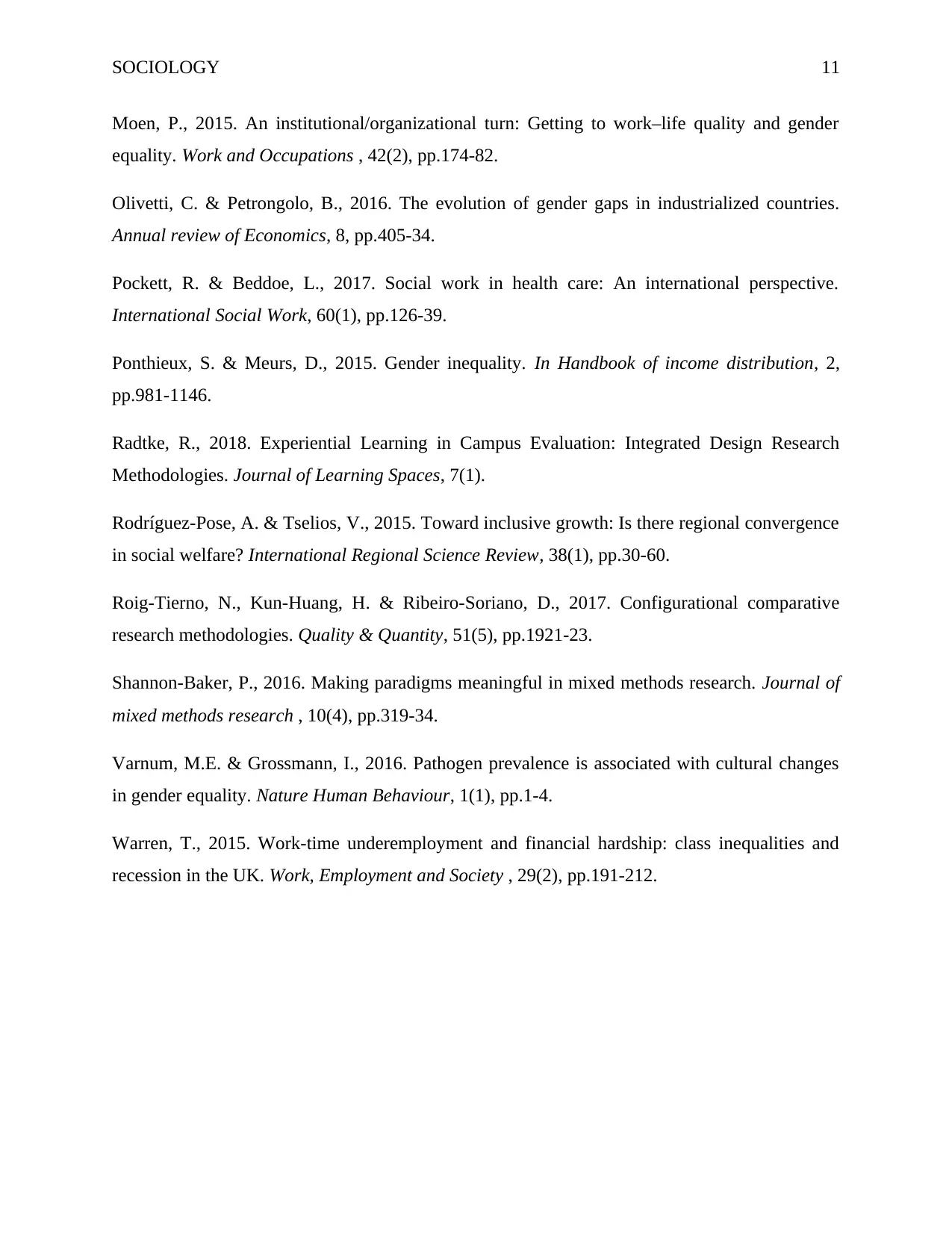
SOCIOLOGY 11
Moen, P., 2015. An institutional/organizational turn: Getting to work–life quality and gender
equality. Work and Occupations , 42(2), pp.174-82.
Olivetti, C. & Petrongolo, B., 2016. The evolution of gender gaps in industrialized countries.
Annual review of Economics, 8, pp.405-34.
Pockett, R. & Beddoe, L., 2017. Social work in health care: An international perspective.
International Social Work, 60(1), pp.126-39.
Ponthieux, S. & Meurs, D., 2015. Gender inequality. In Handbook of income distribution, 2,
pp.981-1146.
Radtke, R., 2018. Experiential Learning in Campus Evaluation: Integrated Design Research
Methodologies. Journal of Learning Spaces, 7(1).
Rodríguez-Pose, A. & Tselios, V., 2015. Toward inclusive growth: Is there regional convergence
in social welfare? International Regional Science Review, 38(1), pp.30-60.
Roig-Tierno, N., Kun-Huang, H. & Ribeiro-Soriano, D., 2017. Configurational comparative
research methodologies. Quality & Quantity, 51(5), pp.1921-23.
Shannon-Baker, P., 2016. Making paradigms meaningful in mixed methods research. Journal of
mixed methods research , 10(4), pp.319-34.
Varnum, M.E. & Grossmann, I., 2016. Pathogen prevalence is associated with cultural changes
in gender equality. Nature Human Behaviour, 1(1), pp.1-4.
Warren, T., 2015. Work-time underemployment and financial hardship: class inequalities and
recession in the UK. Work, Employment and Society , 29(2), pp.191-212.
Moen, P., 2015. An institutional/organizational turn: Getting to work–life quality and gender
equality. Work and Occupations , 42(2), pp.174-82.
Olivetti, C. & Petrongolo, B., 2016. The evolution of gender gaps in industrialized countries.
Annual review of Economics, 8, pp.405-34.
Pockett, R. & Beddoe, L., 2017. Social work in health care: An international perspective.
International Social Work, 60(1), pp.126-39.
Ponthieux, S. & Meurs, D., 2015. Gender inequality. In Handbook of income distribution, 2,
pp.981-1146.
Radtke, R., 2018. Experiential Learning in Campus Evaluation: Integrated Design Research
Methodologies. Journal of Learning Spaces, 7(1).
Rodríguez-Pose, A. & Tselios, V., 2015. Toward inclusive growth: Is there regional convergence
in social welfare? International Regional Science Review, 38(1), pp.30-60.
Roig-Tierno, N., Kun-Huang, H. & Ribeiro-Soriano, D., 2017. Configurational comparative
research methodologies. Quality & Quantity, 51(5), pp.1921-23.
Shannon-Baker, P., 2016. Making paradigms meaningful in mixed methods research. Journal of
mixed methods research , 10(4), pp.319-34.
Varnum, M.E. & Grossmann, I., 2016. Pathogen prevalence is associated with cultural changes
in gender equality. Nature Human Behaviour, 1(1), pp.1-4.
Warren, T., 2015. Work-time underemployment and financial hardship: class inequalities and
recession in the UK. Work, Employment and Society , 29(2), pp.191-212.
⊘ This is a preview!⊘
Do you want full access?
Subscribe today to unlock all pages.

Trusted by 1+ million students worldwide
1 out of 12
Related Documents
Your All-in-One AI-Powered Toolkit for Academic Success.
+13062052269
info@desklib.com
Available 24*7 on WhatsApp / Email
![[object Object]](/_next/static/media/star-bottom.7253800d.svg)
Unlock your academic potential
Copyright © 2020–2026 A2Z Services. All Rights Reserved. Developed and managed by ZUCOL.





